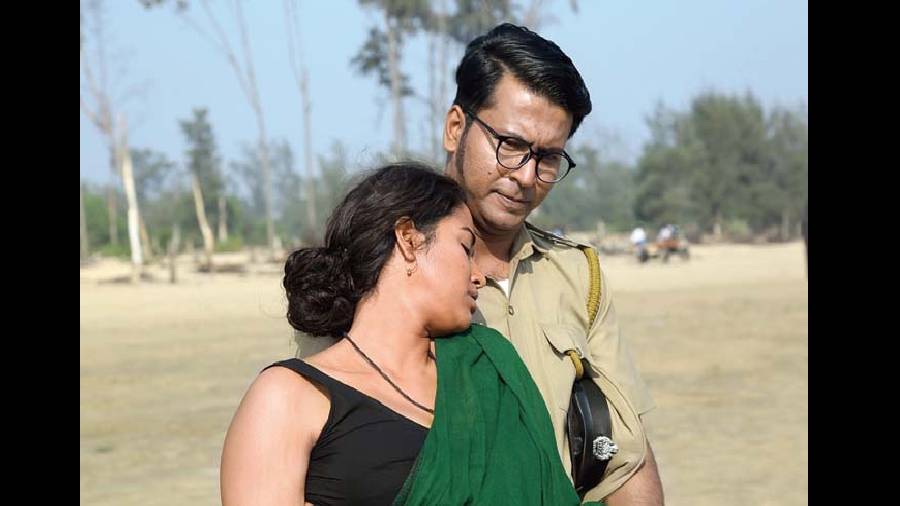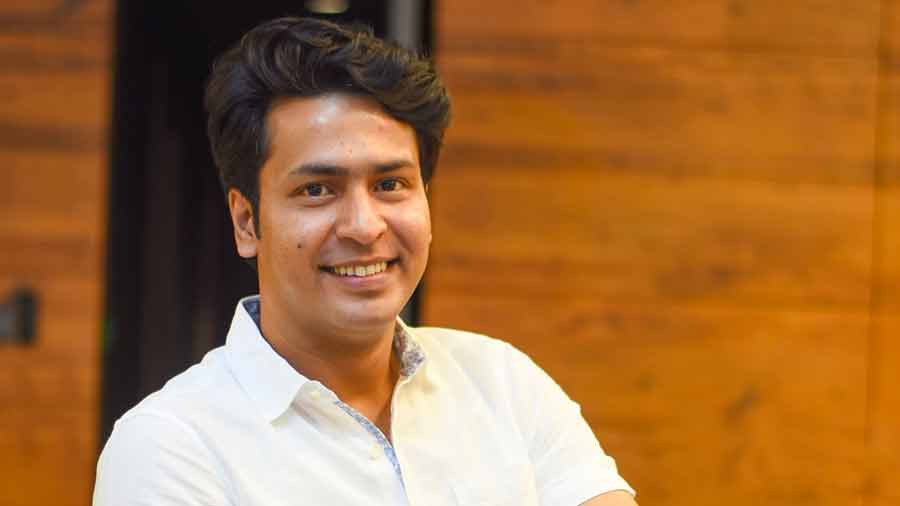A flood of heart-warming words of praise, posts, tweets, reviews and messages have signalled the success of the Hoichoi web series Mandaar directed by Anirban Bhattacharya. The actor, who is already working on his first feature film Ballavpurer Roopkotha as a director, sat down with The Telegraph recently to talk about the widely acclaimed series, the shoot of which started in January 2021. Based on Macbeth, Mandaar depicts the rivetting interplay of power and prophecies, greed and lust set along the shoreline of Geilpur. A The Telegraph chat....
In Mandaar, your character says, ‘Trust me, you won’t be disappointed.’ Is that true for Anirban the director as well?
(Smiles) It is my first work as a director. So I can’t really say that about myself as a director. The charm of the first work lingers on, and the audience also accepts it. But the real deal begins now.
But in terms of feedback, there has been a spontaneous burst of emotion and acclaim...
Yes, but to answer your first question it is for the audience to say whether they would like to have trust in me as a director. In an age when all kinds of content are being created constantly, no one knows what will connect with the audience. No one knows what the verdict will be. It has gone into a very unpredictable zone. Once I have delivered two-three projects, maybe I’ll be in a better position to think about this question. Of course, I am really happy. I had never imagined that Mandaar would be greeted with such an amazing response. We would recheck constantly and make corrections during the post-production stages. Actually, I was the only one in the team who was initially a bit underconfident about how the audience would react once it started streaming. Will there be a connect with the soul of Mandaar, that’s what I was wondering. Thankfully almost 90 per cent of the allegory and symbolism connected.
Does it put added pressure on you once you venture into your second work as a director?
Since I am enjoying the work that I am doing, there is no pressure as such. We are going through a time where we have to keep on churning out content on a regular basis. It is the order of the day. I hear comments like if we deliver so many projects, the quality of work will go down. Times have changed and this observation is no longer valid. One has to do so much of work. Otherwise one will not be able to sustain oneself. Gone are the days when one would come up with one project in one or two years. Our lives, our infrastructure, doesn’t support it.
How will you balance out your acting work with direction?
I don’t want my career in acting to get destroyed. The reason being I really like to act. I enjoy it. Over the years I have put in a lot of hard work to develop my craft. It has been an artistic struggle and I don’t want to give up on that. Primarily I would like to act. I would like the acting-directing ratio to be 80:20!
In Dwitiyo Purush, your character Khoka would dig into chicken chowmein and chilli fish. In Mandaar, it is the humble but formidable luchi....
In Mandaar, it is about the appetite... for everything, an endless appetite... a desire to eat up someone.
Tell us more about Muqaddar Mukherjee. How did he emerge?
It came from a logical require-ment. We had written a lot and then felt that a police officer was required. In films like Shool or Gangaajal or Nayattu, the character of a police officer is depicted in very interesting ways. Actors have certain hidden desires. In the past, I had often wondered when I would be cast in such an interesting role of a police officer. I had similar thoughts on the role of a lawyer. However, I was not supposed to play Muqaddar. We had many sessions to figure out who would play him. I had spoken to many for that role. But things were just not working out. Then one day, I still remember, we were returning after doing a technical recce. I felt that we already had a huge ensemble cast of actors. And somehow we were still looking for someone to play Muqaddar after so many days. Which is when I decided that I would play him. But it is really difficult to enjoy the process of acting when I am directing. For example, when I am in the frame acting for a scene by the sea, I would again have to walk back to check the monitor. So, you can imagine what would happen. Ideally, I would not like to act when I direct. Muqaddar is the foreign element in an indigenous society. He brings forth another layer of corruption to the story, which is urban corruption.
How did you arrive at the decision of making the tone of his voice the way it is?
So he is the soft-spoken person who is an absolute shoyetan! That’s the contrast. But I feel I would have done an even better job with the role if I wasn’t directing. I had so many different things to look after. But I don’t want to offer any excuses.

Anirban and Sohini in 'Mandaar', streaming on Hoichoi
Mandaar has been shot in a stylised way. Are you developing a certain signature style as a director with the choices you have made — be it the tracking shots, the rotating camera, the innovative use of colour and sound, the slow-motion scenes — to tell the story in a visually rich manner? Or did the story need this visual treatment?
It’s about the story. People and characters motivate me. And I believe everything has been done in world cinema. There isn’t anything ‘new’ in the way a story is being told now. We knew that we were not telling a realistic story. That was the main clue for the cinematography. I did not want the story to go towards a logical narrative.
One of the high points of Mandaar is that amazing intercut between two sequences — the marriage scene and Mandaar secretly returning home at night on his bike with murder on his mind. It is the beginning of one journey and the end of another. Or in another way it can be seen as how the fortunes turn for the characters in those two sequences that run parallelly. The irony is also underlined. And what Dablu Bhai does at the end of the marriage scene to Sohini Sarkar’s character Laili serves as another motive for Mandaar to settle scores that night. How did you develop it? Was the treatment mentioned in the script?
It was not there in the first draft of our script. The intercut with the marriage sequence wasn’t there. But I felt something was missing. I told Pratik (screenplay writer) that a smiling, shining moment of the couple was missing in this whole tragedy. We felt that would make the tragedy deeper. That’s how we decided on the marriage sequence. The intercut came in the final draft. The way it has been designed... that credit goes to Sanglap Bhowmik (editor).
What was your headspace on the first and last day of shoot?
I had told Madhurima (wife) that I would call and keep the phone on the loudspeaker when I say ‘action’ on the first and last day of the shoot! It was a special feeling.
